To the historian cognizant of American history and its significance, 2020 does not simply mark a new decade. It marks the 400th anniversary of a tiny band of people called Pilgrims who braved an ocean to plant a church and a colony in the wilderness of New England in 1620. But why did they come? For gold or God? Was their motive significant? Did they leave a positive legacy that could inspire us today?
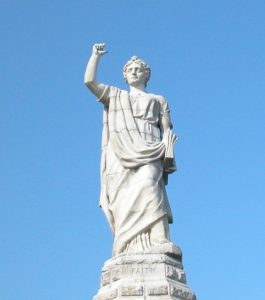 To understand why the Pilgrims came one must understand who they were. During the great revival known as the Reformation, individuals later to be known as Pilgrims were converted. Surrendering to Christ, they began to “reform without tarrying for any.” In other words, the Word of God convicted their conscience and a change was wrought in their character. The Pilgrim Story begins with their faith. But that faith soon found refuge when they, with others “as the Lord’s free people joined themselves (by a covenant of the Lord) into a church estate, in the fellowship of the gospel, to walk in all His ways made known, or to be made known unto them… whatsoever it should cost them.”
To understand why the Pilgrims came one must understand who they were. During the great revival known as the Reformation, individuals later to be known as Pilgrims were converted. Surrendering to Christ, they began to “reform without tarrying for any.” In other words, the Word of God convicted their conscience and a change was wrought in their character. The Pilgrim Story begins with their faith. But that faith soon found refuge when they, with others “as the Lord’s free people joined themselves (by a covenant of the Lord) into a church estate, in the fellowship of the gospel, to walk in all His ways made known, or to be made known unto them… whatsoever it should cost them.”
It cost them plenty. Pastors were forced to be licensed and parishioners had to attend only one church or face arrest and for some, death. Eventually, they made the decision to go to the Netherlands where there was a measure of religious liberty in 1607. A failed attempt at escape had them betrayed, arrested, paraded through the streets of Boston and put in jail. The next year the men escaped, but at the cost of being separated from the women and children who were stuck in the mud at low tide! The men were nearly ship-wrecked before getting to Amsterdam and the women and children spent time in the custody of the magistrates until they were released, joining the men in the Spring of 1609.
Already there were some who looked upon these converts and their story as “an adventure almost desperate, a case intolerable and a misery worse than death.” Bradford writes, however “These things did not dismay them, though they did sometimes trouble them; for their desires were set on the ways of God and to enjoy His ordinances; but they rested on His providence, and knew Whom they had believed.” The Pilgrim story is one of trust in God’s providence and sovereignty that He knows best.
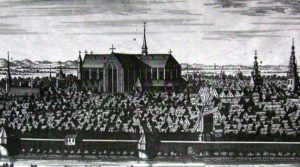
Amsterdam was home to everyone who had been persecuted in England. Once free, their churches began splitting over minor issues and thus Pastor Robinson and Elder Brewster sought a much quieter place to grow the church under their care. They were interested in more than separation from what was wrong, having a goal of growing in Christ and living out one’s faith. The Leyden church, which grew to over 300 by 1620, “came as near the primitive pattern of the first churches as any other church of these later times have done, according to their rank and quality.” A church in covenant, choosing their leaders, and practicing self-government was indeed a rare example of believers worth emulating!
Having to obtain permission to immigrate to Leyden from Amsterdam, the Pilgrims promised “to earn their living without being a burden to anyone.” In other words, they would have to let their character and work ethic cause someone to hire them – it was not an entitled right. Soon, the testimony of the congregation was that they could be trusted due to honesty and a tireless ethic of productivity.
 So why did they leave Holland? The truce with Spain was to end in 1620, and that meant almost certain war. The country was hard, and the church had probably grown to its maximum number. They were getting older, and their children were beginning to adopt Dutch ways instead of English. That concerned them. However, their primary motive was “a great hope and inward zeal of laying some good foundation, or at least to make some way thereunto, for the propagating and advancing the gospel of the kingdom of Christ in those remote parts of the world; yea, though they should be but even as stepping stones unto others for the performing of so great a work.”
So why did they leave Holland? The truce with Spain was to end in 1620, and that meant almost certain war. The country was hard, and the church had probably grown to its maximum number. They were getting older, and their children were beginning to adopt Dutch ways instead of English. That concerned them. However, their primary motive was “a great hope and inward zeal of laying some good foundation, or at least to make some way thereunto, for the propagating and advancing the gospel of the kingdom of Christ in those remote parts of the world; yea, though they should be but even as stepping stones unto others for the performing of so great a work.”
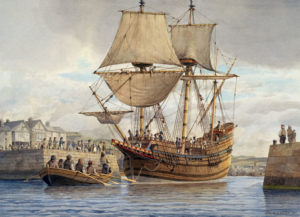 Pastor Robinson told them to follow him no further than he followed Christ. Be ready to discern truth by studying the Bible for yourself. He told them to focus on being right with God and one another, not receiving offenses, working for the common good, and choosing civil officers based on character rather than empty promises. Sounds like advice we can use today. But they lost the only ship they owned, the Speedwell, as well as 20 of their own group, along with losing much of their resources. Success did not appear on the horizon when they departed from Plymouth England in early September.
Pastor Robinson told them to follow him no further than he followed Christ. Be ready to discern truth by studying the Bible for yourself. He told them to focus on being right with God and one another, not receiving offenses, working for the common good, and choosing civil officers based on character rather than empty promises. Sounds like advice we can use today. But they lost the only ship they owned, the Speedwell, as well as 20 of their own group, along with losing much of their resources. Success did not appear on the horizon when they departed from Plymouth England in early September.
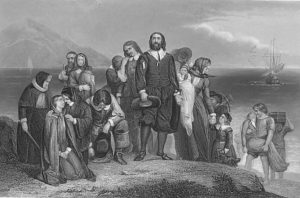 However, the motive of faith flowered in a recipe of success through hardship. It involved a church plant with twenty-four families of men, women and children in covenant! This was unheard of in their day but virtually assured them success where other plantations had failed. Furthermore, when they landed on the tip of Cape Cod, it was their ideas, laid before God, that gave them success!
However, the motive of faith flowered in a recipe of success through hardship. It involved a church plant with twenty-four families of men, women and children in covenant! This was unheard of in their day but virtually assured them success where other plantations had failed. Furthermore, when they landed on the tip of Cape Cod, it was their ideas, laid before God, that gave them success!
The idea of looking to Scripture to find solutions to problems shifted their practice of common ownership to personal stewardship. It tripled their production. Bradford had said that to continue in the old way would make them appear “to be wiser than God.” Innovation caused them to become more productive and allow individuals to voluntarily share rather than be forced into equal distribution.
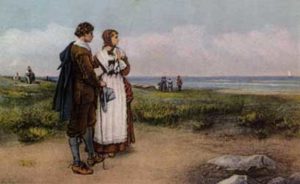 So why honor this small, remnant church group? They were never wealthy, numerous, or filled with elite leaders. However, the ideas brought on that boat that landed in December of 1620 in Plymouth harbor have stood the test of time as foundation stones for our nation. It was their faith that inspired them to come as a church, and it was their faith that brought them as families. It was also their faith that led them to practice a commonwealth of self-government under the rule of law that became the cornerstone of our Republic. It was their faith that produced private enterprise. And it was their faith that inspired them to stay when the Mayflower returned home in April of 1621.
So why honor this small, remnant church group? They were never wealthy, numerous, or filled with elite leaders. However, the ideas brought on that boat that landed in December of 1620 in Plymouth harbor have stood the test of time as foundation stones for our nation. It was their faith that inspired them to come as a church, and it was their faith that brought them as families. It was also their faith that led them to practice a commonwealth of self-government under the rule of law that became the cornerstone of our Republic. It was their faith that produced private enterprise. And it was their faith that inspired them to stay when the Mayflower returned home in April of 1621.
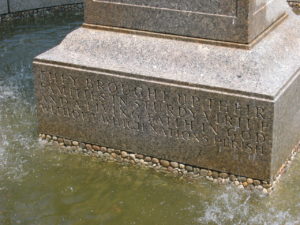 It was also their faith in God through Christ that maintained their multi-generational vision. As Bradford declared, he wrote his history “that their children may see with what difficulties their fathers wrestled in going through these things in their first beginnings, and how God brought them along.” As the corner stone of the Pilgrim Mother monument declares in Plymouth, they brought up their families in sturdy virtue, and a living faith in God, without which nations perish. Join us June 28-30 at the American Pilgrimage 400!
It was also their faith in God through Christ that maintained their multi-generational vision. As Bradford declared, he wrote his history “that their children may see with what difficulties their fathers wrestled in going through these things in their first beginnings, and how God brought them along.” As the corner stone of the Pilgrim Mother monument declares in Plymouth, they brought up their families in sturdy virtue, and a living faith in God, without which nations perish. Join us June 28-30 at the American Pilgrimage 400!







